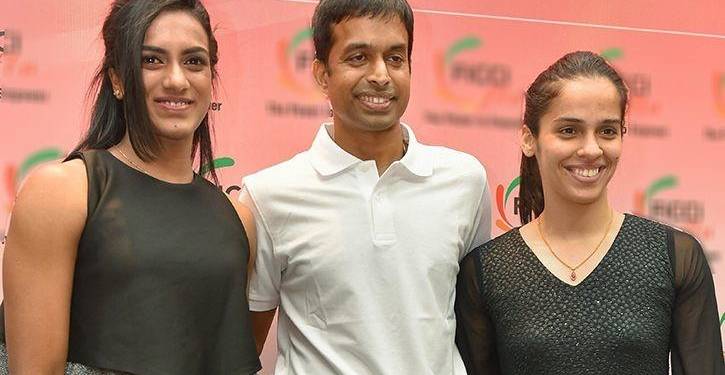There was a guru whose skill was unmatched by any, and none knew this better than two of his most famous disciples. Both the disciples were brilliant in their own right. However, fate took a turn and one thought it appropriate to leave her guru. She thought that the Guru’s approach was anachronistic, and it was time for her to make a mark. But the reverse happened. The pupil remained where she was, and under the supervision of the Guru became the second disciple sugar.
This is no figment of imagination, but the reality, and it is an interesting story about badminton star turned coach Pullela Gopichand, two of his famous disciples, Saina Nehwal and PV Sindhu.
Once the winner of the All England Championship in 2001, Pullela Gopichand decided to take the task of rejuvenating badminton in India into his own hands, and with everything put at stake, he decided to open the Gopichand Badminton Academy.
Initially, he faced a lot of hardships, but things would soon change for the better by 2008 when one of his disciples Saina Nehwal emerged on the horizon of world badminton.
The venue was Beijing and the occasion was the 2008 Beijing Olympics. Like many sports, in badminton, India used to send its players for mere formality. But Saina was not among them. Saina Nehwal became the first Indian player to reach the pre-quarterfinals of Olympic badminton after Dipankar Bhattacharya as she surprised everyone by defeating Wang Chen of Hong Kong, the silver medalist of the 2007 World Badminton Championships, thus ensuring her place in the quarter-finals. Even though she lost to Maria Christiana Yulianti of Indonesia, Saina had laid the foundation for the revival of Indian badminton. Since then, she never looked back.
Under the tutelage of Pullela Gopichand, Saina scripted new heights for Indian badminton. Whether it was winning a gold medal at the Junior World Badminton Championships in 2008, or a gold medal at the 2010 Commonwealth Games, or winning India’s first individual silver medal in the 2011 World Super Series, Saina was slowly turning to India’s new sports icon.
However, her biggest achievement came in the London Olympics 2012, when she won a bronze medal, a first for India. It was from this very Pullela Gopichand Academy that players like Sai Praneeth, Kidambi Srikanth, Parupalli Kashyap, RMV Gurusai Dutt and Arun Vishnu also emerged on the horizon of the world badminton.
At the same time, PV Sindhu also made her presence felt on the international stage when she defeated London Olympic gold medalist Li Xuerui in the quarterfinals of Li Ning China Masters tournament by 21-19, 9-21, 21-16 to enter the semi-finals. Even though she had lost the semi-finals, she had proved that there are many hidden tigers in India waiting to be discovered.
In 2013, PV Sindhu won the bronze medal in the women’s singles category, ending India’s medal drought after 26 years. It was India’s first individual medal since Prakash Padukone’s bronze medal in the 1987 edition. Shortly thereafter, in 2014, Sindhu again won a bronze medal while retaining her place at the podium, while Saina Nehwal was eliminated in the quarter-finals. From here, cracks began to be visible in the trio of Gopichand-Saina-Sindhu.
Many people have differences on the reason why Saina left the Gopichand Academy. But according to Scroll.in, Saina was unhappy that she did not get special attention in the academy as compared to other disciples, whereas Pullela Gopichand, like an ideal teacher, gave equal training to all the disciples.
For this reason, soon after the completion of the World Championships, Saina left the training imparted by Gopichand Academy and started training with her personal trainer, U Vimal Kumar.
Initially, Saina had an advantage when she entered the finals at the 2015 World Championships, being the first Indian to do so. But this joy did not last long, and she made a first-round exit at the 2016 Rio Olympics. On the other hand, PV Sindhu focused solely on her goal and went one step ahead of Saina to enter the finals in the women’s singles event at the Rio Olympics. Although she suffered defeat at the hands of Spain’s Carolina Marin, PV Sindhu’s silver medal was also the first silver medal won by India in Olympic badminton.
After this, PV Sindhu slowly, but steadily went ahead of Saina Nehwal. Internationally, even though Saina Nehwal is ahead in the head to head encounter, PV Sindhu is considered a notch above Saina Nehwal on an overall basis. Irrespective of the tournament, PV Sindhu would return mostly with a minimum of a podium finish.
PV Sindhu also made history in the Asian Games when she defeated Akane Yamaguchi to reach the final of the Asian Games women’s singles badminton event. She became the first Indian to do so, the best performance previously being an individual bronze by Syed Modi in Asian Games 1982 edition.
The very same year, PV Sindhu also won a gold medal in the WWF World Tour Finals, overcoming her strange final phobia, and became the first Indian to do so. As if that was enough, she overcame her World Championship phobia by defeating Nozomi Okuhara of Japan in straight sets to win the World Badminton Championship in 2019, becoming the first Indian to attain this title, irrespective of category.
Today, PV Sindhu is considered amongst the top players of the world, while Saina Nehwal is far from being her best. As such, it wouldn’t be wrong to say that had Saina not kept her personal interests above that of her sport and her nation, and continued to be a pupil of Pullela Gopichand, she would’ve been alongside PV Sindhu and adding more laurels for the nation.



























